Elżbieta Zawacka
Elżbieta Zawacka (Polish pronunciation: [ɛlˈʐbjɛta zaˈvat͡ska]; 19 March 1909 – 10 January 2009), known also by her war-time nom de guerre Zo, was a Polish university professor, scouting instructor, SOE agent and a freedom fighter during World War II. She was also a Brigadier General of the Polish Army (the second and last woman in the history of the Polish Army to hold this rank), promoted by President Lech Kaczyński on 3 May 2006. Sometimes called "the only woman among the Cichociemni", she served as a courier for the Home Army, carrying letters and other documents from Nazi-occupied Poland to the Polish government in exile and back. Her regular route ran from Warsaw through Berlin and Sweden to London. She was also responsible for organizing routes for other couriers of the Home Army.
Elżbieta Zawacka | |
|---|---|
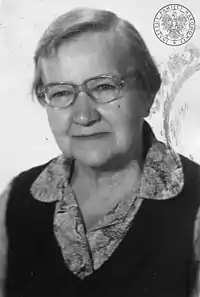 Zawacka, 1984 | |
| Nickname(s) | Zo, Zelma |
| Born | 19 March 1909 Thorn, German Empire (today Toruń, Poland) |
| Died | 10 January 2009 (aged 99) Toruń, Poland |
| Allegiance | Poland |
| Service/ | Polish Land Forces Związek Walki Zbrojnej |
| Years of service | 1939-1945 |
| Rank | Generał brygady (Brigadier General) |
| Battles/wars | World War II |
| Awards | Order of the White Eagle, Virtuti Militari, Krzyż Walecznych |
| Other work | Professor, scouting instructor, freedom fighter |
| Part of a series on the |
Underground State |
|---|
 |
Biography
Zawacka was born in Toruń (Thorn), part of the Prussian Partition of Poland, and graduated from University of Poznań with a major in mathematics. In the late 1930s she worked as a teacher at several high schools, simultaneously working as an instructor for the Przysposobienie Wojskowe Kobiet (Female Military Training). During the Polish September Campaign, she was the commandant of the Silesian District of Przysposobienie Wojskowe Kobiet, participating in the defence of Lwów.
In October 1939 she joined the Silesian branch of Związek Walki Zbrojnej under the nom de guerre "Zelma", which later was changed to "Zo". In late 1940 she was moved to Warsaw and began her courier trips. She was also a deputy of Zagroda — the Department of Foreign Communication of the Home Army. In February 1943 she traveled across Germany, France and Spain to Gibraltar, where she was transported by air to London. In Great Britain she went through parachute training, and on 10 September 1943, dropped into Poland, which led to her being described as "the only woman in the history of the Cichociemni", this title however has been disputed, as she had not completed the full training required.[1]
In 1944 Zawacka fought in the Warsaw Uprising and after its collapse moved to Kraków, where she continued her underground activities. In 1945 she joined the anti-Communist organization Freedom and Independence (WiN), but quit soon afterwards and took up a teaching job.
In 1951 she was arrested and tortured by Urząd Bezpieczeństwa (Security Service of the Ministry of Internal Affairs). She was sentenced to 10 years in prison for treason and espionage, but her sentence was shortened and she was released in 1955. After her release from prison, she earned a doctorate degree from Gdańsk University. She was a tenured professor at the Institute of Pedagogy at Mikołaj Kopernik University in Toruń where she established the department of Andragogy. She retired from teaching in 1978 after Służba Bezpieczeństwa closed the department. She was an active member of the World Union of Home Army Soldiers and cooperated with Solidarność in the 1980s.
Decorations
Decorations awarded to Elżbieta Zawacka include:
- Order of the White Eagle (1995)
- Order of Virtuti Militari, Silver Cross, twice
- Cross of Valour 5 times
- Commander's Cross with Star of the Order of Polonia Restituta, also awarded the Officer's Cross
- Gold Cross of Merit with Swords
- Home Army Cross
- Army Medal
- Medal Pro Memoria
Gallery
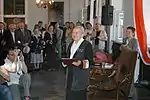 Elżbieta Zawacka in 2006
Elżbieta Zawacka in 2006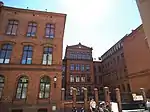 Former Municipal Junior High School and the Classical and Humanistic Female Lyceum in Toruń, which she graduated, among others gen. prof. Elżbieta Zawacka
Former Municipal Junior High School and the Classical and Humanistic Female Lyceum in Toruń, which she graduated, among others gen. prof. Elżbieta Zawacka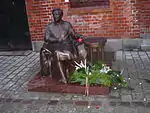 Monument of Elżbieta Zawacka in Torun, unveiled on September 23, 2014
Monument of Elżbieta Zawacka in Torun, unveiled on September 23, 2014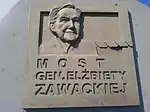 Plaque on the road bridge of Elżbieta Zawacka in Toruń
Plaque on the road bridge of Elżbieta Zawacka in Toruń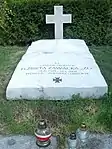 The grave of Elżbieta Zawacka at the Cemetery of St. George in Torun
The grave of Elżbieta Zawacka at the Cemetery of St. George in Torun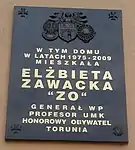 Commemorative plaque on the block at Gagarina street 132-138 in Toruń
Commemorative plaque on the block at Gagarina street 132-138 in Toruń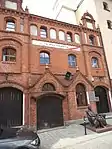 Elżbieta Zawacka Foundation Headquarters in Toruń
Elżbieta Zawacka Foundation Headquarters in Toruń
See also
References
- Półturzycki, Józef (2014). "Spór o Elżbietę Zawacką – żołnierza i pedagoga". Rocznik Andragogiczny (in Polish). 21 (0): 317–332. doi:10.12775/RA.2014.023. ISSN 2391-7571.
External links
- Mowią Wieki. Magazyn Historyczny. October 2007. p. 11.
- "Elżbieta Zawacka". Archived from the original on 2011-07-18. Retrieved 2008-04-12.
- "Zawacka Elżbieta". Internetowa encyklopedia PWN (in Polish). Wydawnictwo Naukowe PWN. Archived from the original on 2012-03-02. Retrieved 2007-11-27.
- "Zawacka Elżbieta". WIEM Encyklopedia (in Polish). Retrieved 2007-11-27.